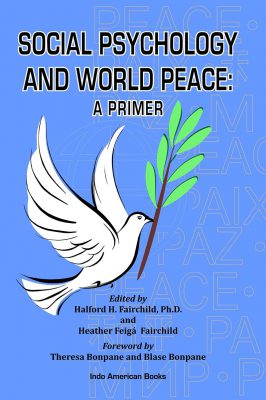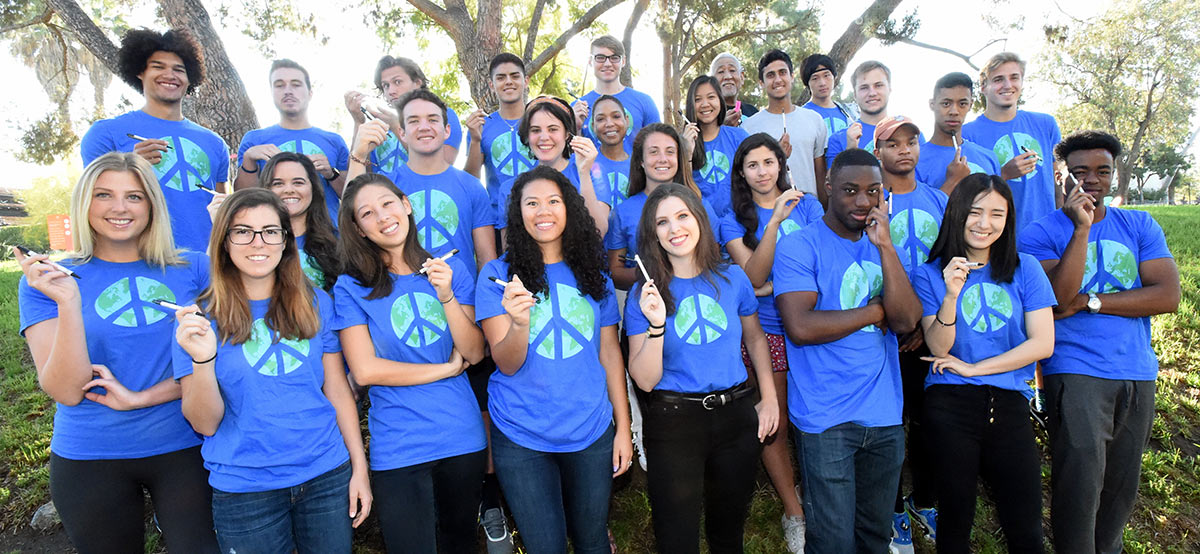
Claremont, Calif. (May 24, 2018)—Social Psychology and World Peace: A Primer, a new book co-edited by Pitzer College Professor Emeritus of Psychology and Africana Studies Halford Fairchild and his wife, Heather Feigá Fairchild. The book is a compilation of 75 chapters, 56 of which were written by Pitzer students.
In spring 2016, Fairchild challenged his social psychology class to write essays that would promote world peace by drawing on the major subject areas of social psychology: history and methods, the self, social influence, conformity, close relationships, prejudice and discrimination, group dynamics, and cooperation and competition. The writing-intensive class used Fairchild’s method for writing research-based essays that relied on bibliographic search engines and data management tools at the Claremont Colleges Library.
Fairchild selected well-written papers that made a substantive contribution to the subject matter and work-shopped them in class. Ultimately all but four students contributed chapters to Social Psychology and World Peace. Sasha Forbath ’18 wrote six chapters on topics ranging from domestic terrorism to meditation. Samuel Martin ’18 authored five chapters tackling subjects including climate change and abuses at Abu Ghraib prison. Pitzer students who had three or more publications were Therese Boter ’19, Casey Chong ’19 and Earl Schultz ’18.
 Professor Halford Fairchild’s Spring 2016 Social Psychology Class
Professor Halford Fairchild’s Spring 2016 Social Psychology Class
Fairchild included a selection of 13 “invited chapters” from former students and colleagues, as well as two public domain speeches by former President Barack Obama. For the final chapter, Fairchild wove contemporary commentary into an abridged version of Frederick Douglass’ 1852 speech, “What to the Slave is the Fourth of July?”.
Social Psychology and World Peace: A Primer is the final installment in a series of volumes that Professor Fairchild produced in collaboration with students during the 2015-16 academic year, the last year he taught at Pitzer before his early retirement. The first was (Re)Solving Violence in America, published in two editions (2016 and 2017) and co-written with five students; the second was Black Lives Matter: Lifespan Perspectives (2017), co-written with 25 students. Both (Re)Solving Violence in America and Black Lives Matter have been adopted as textbooks in at least two colleges or universities in the past two years.
These works reflect Fairchild’s approach to education, influenced by thinkers such as Paulo Freire, which casts students as producers of knowledge instead of as passive consumers of information.
“I ask my students to take on the role, not of students, but of teachers,” Fairchild said shortly after the publication of the first book in the series.
For this latest book, Fairchild asked his students “to take what we think we know in social psychology and apply it to the very real problem of violence and conflict in the world at large.”
Fairchild and Fairchild write in the preface that the project was inspired by “our angst at the violence and war that has become commonplace throughout the world.” In their afterword, “A Reach for World Peace,” the editors call for changes in the underlying ideological, cultural and institutional practices that give rise to violence and war.
Social Psychology and World Peace: A Primer was published by Indo American Books and is available on Amazon in paperback, hardback and Kindle editions. The book is also available for free PDF download at ResearchGate.net. Professor Fairchild is donating proceeds from this book series to the Yuri Hosoi Fairchild Endowed Memorial Scholarship and the Halford H. Fairchild Endowed Scholarship in Africana Studies, two endowed scholarships that the Fairchilds established at Pitzer College.